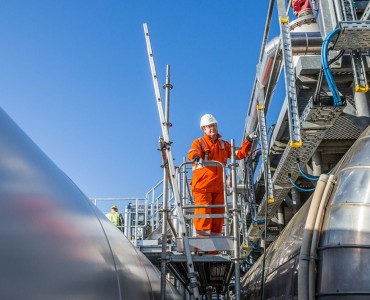The UK government lifted the ban on shale gas exploration, which uses a controversial method of extraction that has come under scrutiny from environmentalists.
The ban, which was lifted with immediate effect, now means the UK will be able to unlock a wealth of unconventional gas reserves buried deep underground and could help with rampant domestic demand, which is currently the highest in Europe.
The UK’s Secretary for the Department of Energy and Climate Change Edward Davey said “my decision is based on evidence. It comes after detailed study of the latest scientific research available and evidence from the leading experts in the field.”
However, Davey said the government would still impose tight controls and monitoring of technology used in hydraulic fracturing, also known as fracking.
“We are still in the very early stages of shale gas exploration in the UK and it is likely to develop slowly. It is essential that its development should not come at the expense of local communities or the environment. Fracking must be safe and the public must be confident that it is safe,” said Davey.
“We are strengthening the stringent regime already in place with new controls around seismic risks. And as the industry develops we will remain vigilant to all emerging evidence to ensure fracking is safe and the local environment is protected. The new Office of Unconventional Gas and Oil, led by DECC, will be able to focus regulatory effort where necessary to meet the needs of future production,” he added.
Fracking involved drilling holes deep into the ground and then using high-pressure liquid to fracture shale rocks to release gas trapped inside and environmentalists have criticised the effect the method would have on the surrounding areas.
The British government placed a temporary halt to fracking last summer after it said two small seismic tremors were experienced while Cuadrilla Resources was fracking for shale gas at their Preese Hall site in Lancashire in April and May 2011.
Shale Gas Could Boost the UK Self-Reliance and Push Down Prices
Shale gas has repeatedly been called a ‘game-changer’ by the International Energy Agency (IEA) for the energy industry, in the past five years.
Shale gas, as part of the unconventional gas sector, could loosen some of the UK’s heavy reliance for its gas needs from country’s such as Qatar and Russia. Cuadrilla believes it could supply a quarter of the UK’s gas needs from the resource in Lancashire.
The Treasury has already signalled its support for the shale gas industry, after proposing tax relief for this sector.
If the UK was more self-reliant for its domestic gas needs, it would also help bring energy prices down, which has already been reflected in the US with its glut of unconventional gas supply, pushing prices down.
“The boom in shale gas production in the United States since the mid-2000s has boosted overall gas supplies substantially, removing the anticipated need to import LNG and driving down prices. As a result, the North American gas market is moving to a different rhythm from the rest of the world and this disconnect is reflected in large price differentials with other markets,” said IEA in its World Energy Outlook 2012 report.
In June 2012, spot gas was trading at as little as $2.10 per million British thermal units (MBtu) at Henry Hub, the leading US trading hub, compared with $9.90/MBtu in the United Kingdom, $12/MBtu for spot LNG in the Mediterranean and $17.40/MBtu for spot LNG in northeast Asia.
The IEA added that “a renaissance of the US energy sector is reshaping the world’s energy landscape, with far-reaching implications” and now the US currently only relies on imports for around 20 percent of its primary energy demand, but rising production of shale gas has allowed it to become all but self-sufficient in net-terms by 2035.
By contrast, most other energy importers become more dependent on imports.
According to a British Geological Survey, commissioned by the government, the UK has far greater reserves of shale gas than previously estimated, which could be worth as much as £1.5tn ($2.4tn €1.8tn).
In 2010, Britain was estimated to have onshore shale gas reserves of 5.3 tn cubic feet.











